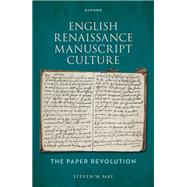English Renaissance Manuscript Culture The Paper Revolution
, by May, Steven W.- ISBN: 9780198878001 | 0198878001
- Cover: Hardcover
- Copyright: 11/14/2023
English Renaissance Manuscript Culture: The Paper Revolution traces the development of a new type of scribal culture in England that emerged early in the fourteenth century. The main medieval writing surfaces of parchment and wax tablets were augmented by a writing medium that was both lasting and cheap enough to be expendable. Writing was transformed from a near monopoly of professional scribes employed by the upper class to a practice ordinary citizens could afford. Personal correspondence, business records, notebooks on all sorts of subjects, creative writing, and much more flourished at social levels where they had previously been excluded by the high cost of parchment. Steven W. May places literary manuscripts and in particular poetic anthologies in this larger scribal context, showing how its innovative features affected both authorship and readership.
As this amateur scribal culture developed, the medieval professional culture expanded as well. Classes of documents formerly restricted to parchment often shifted over to paper, while entirely new classes of documents were added to the records of church and state as these institutions took advantage of relatively inexpensive paper.
Paper stimulated original composition by making it possible to draft, revise, and rewrite works in this new, affordable medium. Amateur scribes were soon producing an enormous volume of manuscript works of all kinds--works they could afford to circulate in multiple copies. England's ever-increasing literate population developed an informal network that transmitted all kinds of texts from single sheets to book-length documents efficiently throughout the kingdom. The operation of restrictive coteries had little if any role in the mass circulation of manuscripts through this network. However, paper was cheap enough that manuscripts could also be readily disposed of (unlike expensive parchment). More than 90% of the output from this scribal tradition has been lost, a fact that tends to distort our understanding and interpretation of what has survived. May illustrates these conclusions with close analysis of representative manuscripts.
As this amateur scribal culture developed, the medieval professional culture expanded as well. Classes of documents formerly restricted to parchment often shifted over to paper, while entirely new classes of documents were added to the records of church and state as these institutions took advantage of relatively inexpensive paper.
Paper stimulated original composition by making it possible to draft, revise, and rewrite works in this new, affordable medium. Amateur scribes were soon producing an enormous volume of manuscript works of all kinds--works they could afford to circulate in multiple copies. England's ever-increasing literate population developed an informal network that transmitted all kinds of texts from single sheets to book-length documents efficiently throughout the kingdom. The operation of restrictive coteries had little if any role in the mass circulation of manuscripts through this network. However, paper was cheap enough that manuscripts could also be readily disposed of (unlike expensive parchment). More than 90% of the output from this scribal tradition has been lost, a fact that tends to distort our understanding and interpretation of what has survived. May illustrates these conclusions with close analysis of representative manuscripts.







